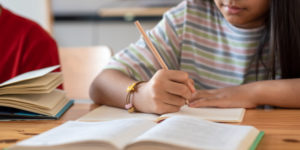Importance of literacy
Literacy is important because it opens up a whole host of opportunities for your child and they will be able to discover new interests, gain valuable knowledge and develop social relationships. Reading and writing are fundamental skills and are used daily throughout an individual’s lifetime.
Standards of literacy
Government literacy targets are currently not being met on a national level, with thousands of children not meeting basic literacy requirements. Literacy rates are particularly poor in deprived areas. In light of these findings, the Government is stepping up its campaign to improve child literacy and has set new targets for this year.
Helping your child with literacy
Parents can play a huge part in their child’s development and learning. Try to listen to your child read as often as possible and help them out when they are struggling; this will help them to learn quicker and boost their self-esteem. Research also suggests that children who are frequently read a bedtime story in their early years are more likely to learn to read faster and with more ease, so try to read to your child regularly; this will also help to build a strong bond between you and your child and will help to get into a routine before bed. Encourage your child to draw from an early age; this will help them to learn how to hold a pencil properly and encourage them to write. Reassure your child and reward good behaviour and accomplishments; this will enable them to see their progress and spur them on to carry on learning.
Making reading and writing fun
Try to vary the activities you do with your child; this may include using a variety of different books and exercises and using fun methods to help them learn; it may be beneficial to take your child to the local library for example where they will be able to get involved in a range of activities, meet friends and choose from a whole new range of books. Using brightly coloured child-friendly materials and equipment can encourage your child to do educational activities; this may include using special pens or colouring in pictures of their favourite character, for example. Try to get involved with your child’s learning as much as possible; this will not only encourage them to learn but will also make the bond between you stronger.
Resources for parents
There are a number of resources available for parents at local libraries and on the internet; these include reading lists, ideas for activities, templates for drawing and colouring in, suggestions for crafts and games and a whole host of other activities. The BBC website has a large section of resources and you can also consult the literacy trust for ideas and suggestions. You may also find it beneficial to discuss ideas with your child’s carers or teachers; you can them find out what your child enjoys doing at school or nursery and copy those activities at home.

